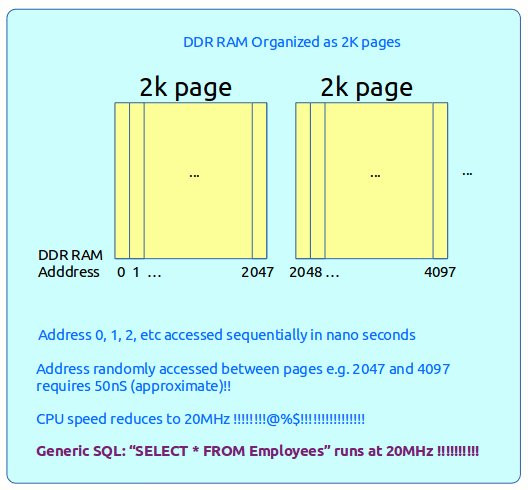DDR DRAM Paging Speed Limit
Micro Hypercube Data Center exploits DDR DRAM paging limitations to be 900% more efficient
DDR DRAM Paging Speed Limitations

- Depending on DDR DRAM chip, it is organized as 1k pages, 2k pages etc. The bigger the page size the greater the power consumption.
- Typically you may find your average modern DDR DRAM uses 2k pages.
- What does that mean in practice in a data center?
- Every time the DDR DRAM is accessed, lets say sequentially from address 0, 1, 2, etc, it will fetch the data from DDR DRAM in about a nano second.
- Typical operation speed hitting nearly 1 GHz speed.
- However if the address jumps to say 4097 which is in the second page, then it takes about 50nS to change page (if done frequently CPU speed falls to about 20MHz).
- With large data set such as "SELECT * FROM Employees" may end up traversing many fields, and they are unlikely to all fit into a 2k page.
- So a large part of the program spends hopping between different data in different pages of DDR DRAM and the whole CPU slows down to 20MHz!
- This only gets worse going from single core to multi-core. A second core may create a noticeable improvement in performance because each CPU has its own cache so each CPU can perform more operations without reaching out to the DDR DRAM. But adding more CPU cripples the performance. You may see a 4% improvement with the 4th CPU, but not much more with increasing number of cores because those extra CPUs want access to the DDR DRAM and tripping themselves over as to who gets access to the DDR DRAM.
- There are some optimizations available to keep the data sequential, but with generic SQL for unstructured data (which is some 93% of all data), there is always doubt as to how it will all work out in the end.
Hypercube Solution
- Hypercube solution splits the data into smaller chunks and have many more CPUs processing each chunk of data.
- This is where Hypercubes come into their own because Hypercubes CPUs are packed into a 3D structure with a 3D wired data center.
- Hypercube design allows the packing of low energy CPUs into 3D volume so that there are approximately 10x as many CPUs available to bear down on a problem than a typical data center for a given power consumption and/or space consumption.
- The CPUs are low energy because they too are unlikely to go faster than 20MHz once they hit the same DDR DRAM paging speed limit.
- Hypercube CPUs and storage consume about 10W and under for each server compared to 200W or so for big energy hungry data center CPUs.
- We use SSDs because mechanical disk have a similar 'paging problem' when changing sectors. Mechanical drives can change sectors randomly at about 20 time a second. While SSDs are at least 10 to 50 times quicker because similar operations are electronic.
- So by using low energy CPUs and SSDs, Hypercubes have the potential to sift through data about 900% more efficiently for a given power constraint and space constraint.
- As a Data Scientist or as management that makes decisions, you may not be told of these issues - why would anyone tell you? More than 90% of all data is unstructured requiring random access to process it which means the CPUs you thought were running at GHz are running no faster than 20MHz!! It only goes downhill from there if you bought virtual PCs because these virtual PCs are contending for DDR DRAM bus and the entire collection of virtual CPUs in one server board must share the 20MHz bandwidth between all of the virtual PCs! Would you be happy to pay for virtual CPUs knowing all this detail?! Not really :)
- We are highlighting these issue strongly to make the commercial case for Hypercube to you to make sure that you not paying for data center processor bills and energy bills that you did not use and purchase a Hypercube Data Center instead.

